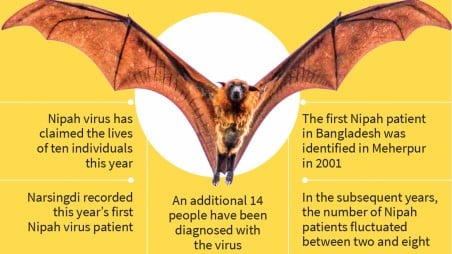Bangladesh reports highest Nipah virus deaths in 7 years
For the first time this year, the virus has been detected in breast milk
This year in Bangladesh, the Nipah virus has claimed the lives of ten individuals, marking the highest death toll from the infection in seven years.
Besides, an additional 14 people have been diagnosed with the virus.
Narsingdi recorded this year’s first Nipah virus patient, according to the Institute of Epidemiology, Disease Control, and Research (IEDCR).
During a discussion titled “Spread and Risks of the Nipah Virus” held at the IEDCR headquarters on Sunday, it was revealed that, for the first time this year, the virus has been detected in breast milk.
During the winter, a festivity surrounding date juice contributes to the spread of a deadly disease across the country. Consequently, researchers and doctors have advised against consuming date juice.
“Nipah virus spreads through bat secretions or saliva. Consuming contaminated raw date palm sap can also lead to the transmission of this virus. Infected individuals can transmit the virus to members of their families or healthcare workers,” said Professor Tahmina Shirin, director at the IEDCR.
To prevent the spread of the virus, she advised against consuming raw date palm sap and not eating half-eaten fruits left exposed in the open.
Date juice, marketed online with enticing labels like “safe” and “boiled,” is contributing to the spread of Nipah virus cases throughout the country.
According to IEDCR data, the first Nipah patient in Bangladesh was identified in Meherpur in 2001. The virus has been found in seven districts of the country.
Since then, a total of 339 individuals have been confirmed to have been infected with the Nipah virus in the country, with 240 fatalities, leading to a mortality rate of 71.44%.
Previously, in 2015, 15 individuals were infected with the Nipah virus in the country, resulting in 11 deaths.
In the subsequent years, the number of Nipah patients fluctuated between two and eight.
For the surveillance and assessment of the spread and risks associated with the Nipah virus in Bangladesh, a collaborative effort between IEDCR and icddr,b has been conducting Nipah surveillance in eight medical college hospitals in the country since 2006.
Dr. Mushtuq Hussain, public health expert and advisor to the IEDCR, said, “To prevent Nipah virus, raw date juice should not be consumed under any circumstances. However, date juice can be consumed after making it into jaggery. In addition to date juice, this virus can also spread through various fruits.
“We must wash fruits and vegetables that we eat unpeeled, such as tomatoes, plums, guavas, and strawberries, with soap. Fruits that we peel, on the other hand, should be washed well with water. Fruits that have been eaten by bats should not be eaten.”
Professor Dr Md Shahadat Hossain, director (Management Information System) at the Directorate General of Health Services (DGHS), said, “The information we provided is for confirmed cases. We are not sure if the people who died recently were infected with the Nipah virus. We need to focus more on case detection.
“Since there is no vaccine for this disease, we need to disseminate information about it to the people. We need to work together towards this goal.”
Professor Dr Meerjady Sabrina Flora, director at the National Institute of Preventive and Social Medicine (NIPSOM), said, “The death rate from the Nipah virus is very high. So, it is difficult to say whether you will survive, even if you are detected early. And those who survive cannot return to a normal life. They are becoming disabled. In other words, there is no way to get rid of Nipah without prevention.”
She added, “We should not invite the Nipah virus by celebrating the juice festival. If you have severe headaches, fevers, and convulsions, you should seek medical advice immediately.”
Professor Flora also pointed out that many hospitals do not want to admit Nipah patients. Because service providers can also be infected. In this situation, the DGHS should issue a letter to all hospitals to dedicate a ward for Nipah patients.
“We are used to using PPE, masks, and gloves during the Covid period. We can also follow that in the case of Nipah,” she added.
Image credit: The Business Standard








